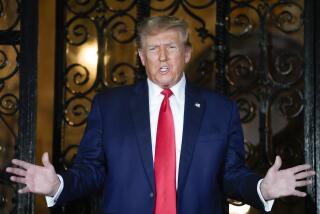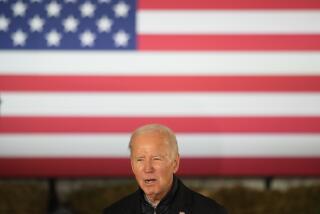A tumultuous chapter, but Trump’s poll standing ticks upward: How come?
Over the last few weeks, President Trump has fired Cabinet secretaries and lost key White House aides. He has discomfited longtime U.S. allies with tariffs that threaten a possible trade war. And he has contended with a sex scandal that threatens to drag him into court.
Through it all, his standing in polls has ticked upward — not hugely, but still by enough to matter.
Why? Credit a growing economy and consolidating support among Trump’s fellow Republicans. For more on what that portends for this year’s midterm elections, read on.
Sign up for the Essential Politics newsletter »
ANOTHER WEEK, ANOTHER FIRING
This time, it was Veterans Affairs Secretary David Shulkin who got the boot — or, to use a more Trumpian image, the tweet.
The firing itself came as no surprise: As David Cloud reported, Shulkin had been undermined for weeks by allegations of ethical lapses and a determined campaign by conservatives, including political appointees in his own department, to oust him because he opposed rapid privatization of the VA health system.
The jolt this time came with the replacement. Trump, in his Twitter message announcing the firing, said he planned to nominate the White House doctor, Adm. Ronny Jackson, to head the Veterans Affairs department.
Jackson is greatly admired by former White House officials in both parties. He has been a White House doctor since the George W. Bush administration and was a favorite of Barack Obama’s staff. (Here is a profile of Jackson by the Washington Post.) But as several key members of Congress and leaders of veterans organizations immediately noted, he has no experience running a big government agency and no known views on key policy issues.
Trump’s decision to put his personal doctor in charge provides the clearest example of how he values personal relationships and loyalties over traditional ideas of expertise.
Now the question is whether the Senate will consent or whether the doctor will become this administration’s version of Harriet Miers, the White House lawyer Bush nominated in 2005 for the Supreme Court, who withdrew within weeks amid accusations of cronyism.
A PUBLIC SERVICE ANNOUNCEMENT
Are you a California voter and an “independent”? Are you sure?
As my colleague John Myers has reported, more than a half million Californians remain registered with the American Independent Party, a group formed a half century ago to back the presidential candidacy of George C. Wallace.
Despite considerable evidence that many of those registrations are errors by voters who consider themselves “independent,” i.e., not a member of any party, lawmakers haven’t acted to eliminate the confusion, Myers wrote.
The problem for voters is that registering as a member of the AIP can prevent them from participating in Democratic or Republican primaries. Voters who correctly register as “no party preference” voters often can participate in primaries.
A BATTLE OVER CARS, MILEAGE AND CALIFORNIA
As Evan Halper reported, EPA Administrator Scott Pruitt has sent the White House his recommendations for a huge rollback of federal mileage standards for new cars and trucks.
The new policy, which could be announced as early as this weekend, would end an Obama administration plan to boost average mileage by 2025 to 55 miles per gallon (about 44 mpg under real-world conditions). The Obama policy was designed to cut greenhouse gas emissions from the nation’s vehicles in half compared with 2010 levels.
The change would put the federal government on a collision course with California and a dozen other states that follow its standards, as Halper explained. Ultimately, the car companies could have to build and sell two different sets of vehicles — one for red states and one for blue states.
Some automakers have pushed for a compromise. We’ll find out in a few days if they succeed.
AND A FIGHT OVER THE CENSUS
The administration’s decision to add a question about citizenship to the 2020 Census generated a huge outcry from immigrant groups and officials in California and other Democratic states.
State attorneys general rushed to court. As Halper reported, their chances of winning probably depend less on big constitutional issues than on more technical questions such as whether the administration has provided enough time for a new question to be tested before it’s added to the every-10-year population count.
The fear in immigrant-heavy areas is that asking about citizenship, which the full census has not done since 1950, will discourage a large number of people from participating. That, in turn, would lead to an undercount that could cost California a seat in Congress and billions in federal money.
INFRASTRUCTURE, AGAIN?
“Infrastructure week” has become a punchline in Washington.
In theory, rebuilding the nation’s roads, bridges and airports is a priority for Trump. In practice, each time the White House says the president will spend a week focused on the issue, he blows up the plan with a high-profile firing, an incendiary tweet or some other distraction.
This week ran true to form, as Cathy Decker and Christi Parsons wrote: After firing Shulkin, Trump went to Ohio, ostensibly to talk about infrastructure, but held forth on almost everything but.
SEX, THREATS AND LAWYERS
The latest infrastructure week began with Stormy Daniels’ much anticipated “60 Minutes” interview in which she alleged that she had been threatened by an unidentified man who warned her not to talk about an alleged sexual encounter with Trump.
As Michael Finnegan wrote, Trump has remained uncharacteristically quiet about the allegations by Daniels and Karen McDougal, the former Playboy model who alleges she had a 10-month affair with Trump.
But lawyers for the two women and Trump have been busy talking in and out of court.
EVERYONE HAS LAWYERS, EXCEPT TRUMP
Even the lawyers have lawyers now. This week, David Schwartz, the lawyer for Trump’s lawyer, Michael Cohen, said in a CNN interview that Cohen had deliberately never told Trump about the $130,000 hush money agreement he struck with Daniels on Trump’s behalf.
That immediately led to questions about whether the non-disclosure agreement Daniels had signed was actually binding. She increasingly seems to be ignoring it, in any case.
The one person having trouble getting lawyers is the president. He lost two more this week, as Chris Megerian wrote — Joe DiGenova and his wife and law partner, Victoria Toensing, decided not to join Trump’s legal team, ostensibly because of conflicts.
That leaves Trump with a heavily depleted defense, increasingly reliant on Jay Sekulow, who is best known as an advocate for conservative religious causes, not as an expert on complex issues of criminal law.
OTHER NOTABLE DEVELOPMENTS
Gina Haspel, Trump’s nominee to head the CIA, has spent a three-decade career wrapped in secrecy. Until last year, she had worked almost her entire adult life undercover.
When she goes before the Senate later this spring for a confirmation hearing, she will suddenly be under an intense spotlight, Megerian reported. Most of the attention likely will focus on her involvement in the Bush administration’s torture of detainees after the 9/11 attacks.
Haspel almost certainly will need Democratic votes to win confirmation. That makes Sen. Dianne Feinstein, the former chair of the Intelligence Committee, a key vote.
Feinstein, meantime, continues to steam toward reelection. This week, she picked up the endorsement of former Vice President Joe Biden, Sarah Wire reported.
California remains the great ATM for Democratic politics. Seema Mehta reports that Barack Obama heads to the state in May for his first, big post-presidential fundraiser, aimed at helping the party’s most endangered Senate incumbent, Sen. Claire McCaskill of Missouri.
Earlier this month, Atty. Gen. Jeff Sessions pleased Trump by firing former FBI deputy director Andy McCabe. But this week, Sessions defied conservative wishes by refusing to appoint a second special counsel to probe the FBI’s handling of politically charged investigations.
Sessions said he would ask a career prosecutor to look into the allegations, but as Joe Tanfani wrote, that’s unlikely to quell demands on the right for a special counsel.
Trump’s been anxious to reassure supporters that his border wall is moving ahead. So he keeps seizing on existing border construction projects to claim progress. The latest inaccurate claim involves fencing near downtown Calexico, Brittny Mejia reported.
In the face of Trump’s attacks, Obama, Bush and other former presidents have remained mostly silent, Christi Parsons reports.
SEX, POLLS AND THE MIDTERMS
The sex allegations have gotten big ratings on television; America is clearly tuning in. But as I noted at the outset, Trump’s poll standing has gone up, not down.
What’s that about, and what does it mean for the midterm elections?
Forecasting the outcome of this fall’s midterms has become a favorite game for political insiders, and there’s just enough evidence on both sides to keep everyone playing.
On the one hand, as Mark Barabak reported, the number of incumbents deciding not to run again has reached the highest level since 1994, with Republicans making up the vast majority.
That’s a bad sign for the majority party since open seats are far easier targets for the opposition.
Another piece of evidence for Democratic hopes — the results of the special elections so far. Democrats consistently have performed well above their typical level.
On the other hand, special elections tend to be low turnout affairs. Can Democratic enthusiasm maintain a big turnout advantage in the fall, when overall turnout likely will be higher?
And then there are the polls.
A president’s approval rating is one of the most reliable numbers for forecasting how midterm elections will turn out. If the incumbent’s approval number sits in the mid-30s, as Trump’s did in mid-December, his party faces dire trouble.
Since mid-December, however, Trump’s approval has risen 4 to 5 points in polling averages. That’s not a lot — Trump’s approval fluctuates in a narrow band — but it’s enough to move the GOP majority from meltdown territory to merely badly at risk.
The shift largely involves Republicans. Trump hasn’t won converts — he really doesn’t try. But he has consolidated support within his own party, partly because he’s no longer talking about healthcare, an issue on which the policies he backed were deeply unpopular, even among many Republicans. Presumably, Republicans who back Trump either don’t believe Stormy Daniels or don’t think she’s telling them anything they didn’t already know or suspect.
How will all this play out in November? Despite much talk, no one really knows. About the most we can say is that the House majority is up for grabs, and either party could win. We’ll find out in a little more than seven months.
LOGISTICS
That wraps up this week. My colleague Christina Bellantoni will be back Monday with the weekday edition of Essential Politics. Until then, keep track of all the developments in national politics and the Trump administration with our Essential Washington blog, at our Politics page and on Twitter @latimespolitics.
Send your comments, suggestions and news tips to politics@latimes.com.
If you like this newsletter, tell your friends to sign up.
More to Read
Get the L.A. Times Politics newsletter
Deeply reported insights into legislation, politics and policy from Sacramento, Washington and beyond. In your inbox three times per week.
You may occasionally receive promotional content from the Los Angeles Times.







